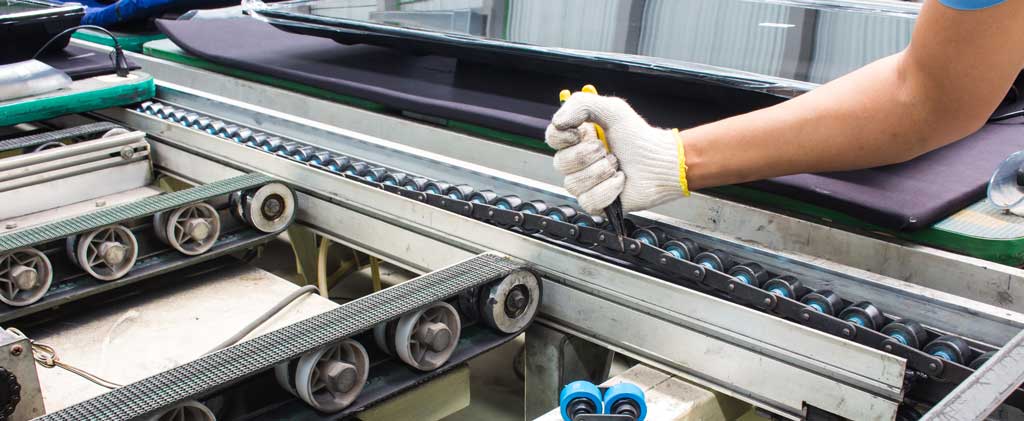Maintenance tips for conveyor belts

Conveyor belts are an indispensable part of the entire production process in many industries. Their performance can optimize the entire procedure or, on the contrary, hinder it. For this reason, companies must worry about carrying out adequate industrial maintenance on their conveyor belts. When the cleaning of the conveyor belts is not carried out or the necessary care for its operation is not taken into account, the performance of the equipment can be compromised and it is likely that you will have to face additional repair expenses, which you would not have to contemplate in the alternative scenario.
The situation is the same for many elements that move materials from one place to another such as pipeline maintenance (if you’re asking yourself “what is pipeline maintenance,” we will give you more on that later). For that reason, avoid additional headaches and expenses by taking into account these tips for the maintenance and care of your conveyor belts.
Maintenance and care for conveyor belts
Taking the appropriate precautions, performing regular maintenance, and thoroughly completing a conveyor belt maintenance checklist will not only improve their performance but can considerably extend their useful life. In this way, you will have a piece of functional and reliable equipment and you will not have to incur additional repair costs due to premature wear or replacement of the belt.
Follow these tips to keep your conveyor belt in top condition:
- Belt storage
If at any time you must store your conveyor belt, it is important that you take some measures to ensure that during this period of time your part does not suffer any damage. That’s why you’ll need to protect them from contamination, moisture, extreme temperatures, and ultraviolet radiation. First, make sure all equipment is covered in opaque dust-proof packaging; Unless your manufacturer assures you it will be fine, do not cover your conveyor belt with plastic as this could allow moisture and mold to form on the part. Secondly, it is preferable that it be stored in a dark place (not in direct sunlight) and that it be handled with care.
- Maintenance must be periodic
One of the simplest ways in which you can ensure that your conveyor belt will not suffer damage and will last in good condition for a long time is to periodically carry out the relevant maintenance. Belts, as well as many other industrial and domestic equipment, require maintenance from time to time to check the state of the internal mechanism and ensure that it can function properly for longer. So don’t underestimate the need to regularly check your conveyor belt and use a tool like a CMMS system to initiate reminders and ensure the work gets done.
- Hire a professional
The most efficient way to protect your conveyor belt from wear and damage is to hire a professional to service the equipment. In this way, you will be sure that your band is in expert and reliable hands.
How to clean a conveyor belt?
The constant cleaning of the conveyor belt is one of the most important guarantees for it to last longer in good condition. In this sense, remember that it is necessary to clean all the elements of the piece very well every time chemicals, oils, or any type of aggressive product that could compromise the tape or any of its components is spilled on it.
The manufacturer will usually advise you of the steps to perform the cleaning. However, you can do it with plenty of water and a suitable detergent. Do not forget that to clean it, it must be in complete rest and out of operation and that it must dry completely before using it again.
The steps to follow in cleaning are:
Below is a method for cleaning a conveyor. When cleaning a conveyor, always work from the top down and from the center out. This will be the most effective method.
- Dry clean
Remove large pieces of debris from the belt. Make sure gears, shafts, and support elements (guides, product supports, etc.) are also clear of debris.
- Pre-rinse
Flush the transport system with water heated to 125-130°F (52-54°C) and 150-300 psi (10-20 bar) pressure.
- Apply detergent
Apply the selected detergent to the conveyor at a pressure of 150 psi (10 bar). Let it work for 10-15 minutes, but do not allow it to dry as this can create chemical buildup that is more difficult to remove.
- Rinse and inspect
Flush conveyor at 40-60 psi (2.8-4.1 bar) with 52-54°C (125-130°F) water. Next, inspect the conveyor and make sure debris, detergents, water, and other residues have been washed out.
- Pre-operation belt
Re-inspect the conveyor and make sure all chemical detergent has been removed from the conveyor. To ensure this, use pH strips (litmus paper) and it will ensure that any basic solution has been removed. Run the conveyor slowly to help dry and remove any accumulated water from the surrounding soil while the conveyor is drying.
- Inspect and release for disinfection
Re-inspect the band using sensory analysis for the presence of bacteria. To check for the presence of bacteria, adenosine triphosphate (ATP) tests should be used. ATP is present in all animal, plant, yeast, and mold cells. If the ATP test shows the existence of any of these, clean the detected area. Relubricate the conveyor if necessary. Then release the belt to disinfect.
- Disinfect
Restart the conveyor at a slow speed and apply the sanitizer in small concentrations according to the manufacturer’s instructions, so that the conveyor does not need to be rinsed. Running the conveyor during this process will ensure that all parts of the conveyor have been exposed to the sanitizer. Lastly, wipe off any disinfectant and flush it down a drain.
As we mentioned before, you may need the help of a specialist to keep your equipment in optimal condition.




